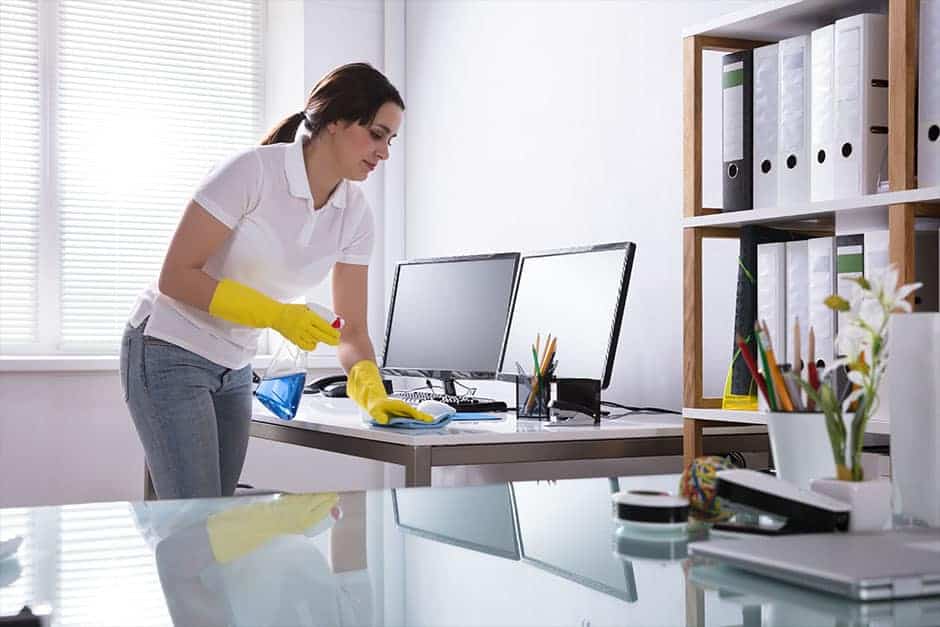
Cleaning industry trends 2019
As 2019 comes to an end, we’re taking the opportunity to look back on the biggest trends within the contract cleaning sector and what we are expecting to see in 2020.
Go, go green
The biggest movement in the last year to hit both the world and the cleaning industry is the push to go green and become more environmentally conscious. The reduction in chemical-based cleaning products, reusable cloths instead of one-use paper and automated dispensing systems are just some of the ways sustainable cleaning is becoming the expected practice.
One of the main methods to bring down both costs of a business and to help the planet is paper waste reduction. At an average cost of nearly £15,000 for a company with only 50 employees [1] replacing paper-based processes is both an environment and money saving method.
Introducing a remote workforce management system, such as Unique IQ’s IQ:timecard will eliminate the need for paper-based timesheets and job lists as employees can clock in and manage their job schedule via a mobile app.
Through smart technology, cleaning companies can also reduce their vehicle emissions, using mobile apps to navigate from one job to another via the shortest route. For example, using IQ:timecard MOBILE’s ‘Schedule Routing’, remote workers can journey plan their day, reducing time spent on the road and emissions.
Advancement in technology
Over the last few years technology has been advancing at a dramatic rate, specifically within the cleaning industry where the introduction of the Internet of Things (IoT) has revolutionised the sector. Although the concept of devices talking to devices has been around for a long time, thanks to advances in mobile and wireless technology, connections have become stronger allowing more machines to easily join a business’ appliance network.
According to a Business Insider Intelligence study, there are set to be 20.4 billion connected things worldwide by the end of 2020 [2]. With an increase of IoT devices, productivity throughout the cleaning industry has also seen an improvement, as staff now have more time to work on the tasks within their schedule, instead of having to worry about jobs which can be automated, such as having to regularly check stock levels of soap dispensers.
Ultimately, the balance of IoT devices and a human workforce can lead to great results, helping to improve the growth, reputation and success of a contract cleaning business.
Flexible working
As flexible working becomes more popular across the UK, the cleaning sector is having to adapt to reflect this growing trend. No more are the days of a 9-5 office role with the cleaning crew entering before/after these hours. Instead we are now seeing a more common influx of 8am starts and 8pm finishes, making the scheduling of cleaning rotas more challenging.
To meet these demands and the flexibility of scheduling remote workers based on the needs of the clients, a remote workforce management software which can make changes at the click of a button and update field workers is vital. By using software such as IQ:timecard, office staff can adapt a working schedule within a few minutes, sending changes in real-time to remote workers who will receive a notification of their new scheduled tasks, preventing wasted time and resources.
Staff-isfaction
A continued focus on workforce satisfaction has been another of the big trends of 2019, both for the business advantages it brings, as much as the obvious human benefits. A recent study from the University of Warwick has proven that happiness in the workplace makes people work harder with a productivity increase of around 12% [3].
The introduction of new technologies is making a contribution to happiness and wellbeing of staff, with the automation brought about by the IoT, for example, freeing people up from more manual, repetitive tasks.
Further to this, mobile technology has brought improvements to the safety and wellbeing of lone workers. With the vast majority of the UK’s cleaning workforce working both alone and remotely, it’s critical that their safety can be assured. By utilising mobile technology, such as our IQ:timecard app, staff members can clock into their scheduled job and send notifications to central staff of their location via GPS. This provides a full history of attendance, and reassurance that their employer has an overview of their last known location.
Industry growth
Our concluding trend for 2019/2020 is the ongoing growth of the contract cleaning sector. According to MTW Research [4] contract cleaning businesses are set for a £95 million boost, with a rise in both public and private sector contracts.
And with the IoT becoming an industry driver in 2020, finding the right balance between technology and the remote workforce will be an important factor as the industry grows.
Staff productivity, accurate client invoicing, reliable reports and meeting compliance are all contributing factors towards company performance in which technology can have a helpful role, which is why a trustworthy system, such as IQ:timecard is a must.
Unique IQ is excited for the future of technology and the impact it will have on the cleaning sector. What are you looking forward to? Or is there a device you would love to see become an IoT? Drop us a message on our social channels, we’d love to hear your thoughts!